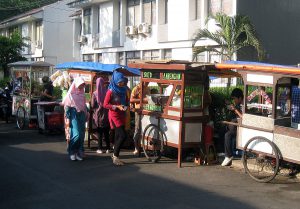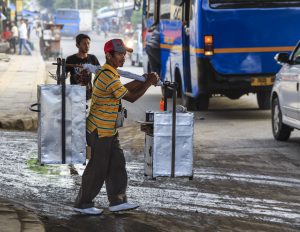Unleashing Indonesia’s Potential
A Look At The Country’s Informal Sector And How It Would Benefit From Liberalization
This article was written by SFL Charter Teams Member Alfi Syahrin Ario Waskito.
When people are asked to share their thoughts on Indonesia, what usually comes to their mind first is the image of a populous third-world country, a huge, tropical archipelago where people still live in the rain forest, and of course famous tourist hotspots such as the island of Bali. But there is much more to it than these clichés. Having spend the better part of my life in Indonesia, I can assure you that there are much more things to discover about this country, and even some valuable lessons to learn when it comes to economic development and the role market reforms play for it. Indonesia, with its 250 million inhabitants, has become the economic powerhouse of Southeast Asia, as indicated by the fact that among the G20 states, only China has a faster-growing economy. Despite this, the ideas of classical liberalism are still met with bewilderment, if not scornful rejection by the vast majority of the population. An exception to this rule is the group of ordinary Indonesians that work in the informal sector.
Buzzing streets, busy vendors

Street vendors in Jakarta. Photo credit: Gunawan Kartapranata,
Let me share a story with you to understand what I mean: In Indonesia, the easiest way to find a good, affordable meal is to go to one of the innumerable street food vendors scattered across the streets of the country’s big cities. Hidden between Jakarta’s massive skyscrapers, you can find them selling their products in the side streets of the main traffic lanes, offering a large variety of meals such as fried rice, porridge, fried chicken or deep-fried catfish. One of my favorite food stalls is operated by a man called Budi, a short, sharp-eyed man of 39 years. Being from a little village in Indonesia, and lacking any kind of formal education, it may be hard to imagine that Budi can make a living in such a big city (the Greater Jakartan metropolitan area is the second largest in the world, totaling to a whopping 30.2 million inhabitants). But against all odds, he became very successful with his business of selling deep fried catfish. His consumers come from every conceivable socio-economic background, from people who rely on old bicycles as their daily means to commute to white-collar workers who own expensive European sports cars.
The profit he makes with his food stall is partly used to fund educational scholarship for children in his home village. When I asked him why he’s doing that, he replied: “Back in my days, it was very hard to get a proper education if you weren’t from a rich family. The government itself doesn’t help you at all (there are no subsidies for education). But people cannot wait until something as uncertain as the government steps in. Why, then, do I not make the first step myself and try to help others?”. Budi is by no means an exception: In Indonesia, there are a lot of people like him, self-employed, informal businessmen from small villages who came to major cities like Jakarta as street vendors, and who would send any excess profits home to help their relatives and friends.
Targets of the government’s caprices
In fact, around 60 percent of Indonesia’s economy relies on this informal sector. The story that locals would tell is that “in Indonesia, you can easily start a business by selling fried rice today, and if you go bankrupt, you can start again by sell porridge tomorrow”. Unfortunately, there are important threats to fortune seekers. Because of their unclear legal status, they became subject to arbitrary extortion by government officials. Vendors unable to pay at the spot risk the destruction of their stall, disregarding even the most fundamental aspects of property rights. Budi, too, has been a victim of these heinous attacks: “In my ten years doing business, I was facing eviction during five of them, and once my stall was destroyed by officials even though I am always paying the extortion fee”, he says. As with many other developing countries, the government’s employees rarely abide by the rule of law, and corruption is rampant.

Mobile food business. Photo by CEPhoto, Uwe Aranas.
Why then, you might rightly ask, are Budi and his fellow businessmen not just moving their business out of this grey area by registering it? They no doubt would like to do so, but it isn’t quite so simple. Regulatory excesses have long been a defining feature of Indonesia‘s bureaucracy, requiring a myriad of special permits before any private business can officially resume its activities. The upshot is that for the average Indonesian businessman, the status quo – with all its obvious drawbacks – is still the cheaper solution. You’ll find this confirmed in the data that the Heritage Foundation compiles into its annual Index of Economic Freedom, where Indonesia ranks a mere 84th, far behind its neighbors Malaysia, Singapore or the Philippines. Even though property rights are by and large respected, enforcement is inefficient and unreliable, and registering property can be difficult. The judiciary has demonstrated independence in some cases, but the court system remains plagued by corruption and other temptations.
Entrepreneurial potential bound in artificial chains
All of this reminds me of the work of the famous Peruvian economist Hernando De Soto, especially his insights into what he calls dead capital. “Dead capital” is de Soto’s term for an asset that cannot easily be bought, sold, valued or used as an investment. Slums are a good example to illustrate this: The poverty of its inhabitants is so salient that we massively underestimate how much capital even these people own. These possessions, however, do not constitute fungible assets. Dead capital cannot, therefore, create value for the poor. Contrast this with how the OECD countries handle the situation. All of them have devised a formal property system of titles and title registers that include real estate used for homes or businesses. De Soto claims that this is in a large part why some nations are rich, while others are stuck in poverty. Or in his own words: “With titles, shares and property laws, people could suddenly go beyond looking at their assets as they are — houses used for shelter — to thinking about what they could be—things like security for credit to start or expand a business.” Poor nations, in this view, hold the key to a more prosperous future in their won hands, but steadfastly refuse to use it.
While the situation in Indonesia isn’t nearly as bleak as in other parts of the world, de Soto’s insights still apply. Many entrepreneurs from the informal sector cannot take their businesses to the next stage because of the legal barrier. Banks are usually afraid to lend them money because the informal sector cannot provide them with the collateral they are looking for. Thus, a vicious cycle is set in motion. Businesses are held back from evolving as a result of excess regulation, and because they are prevented from growing, they won’t find any creditors that could help them to overcome legal obstacles.
Some hope for the future?
Taken together, it shouldn’t be surprising that the ideas of liberty, particularly its economic implications such as free markets, property rights protection and small government become a hope for Indonesians like Budi. In fact, right now we are finally seeing some overdue bureaucratic reform being undertaken that have been spearhead by small entrepreneurs. Many major cities in Indonesia have already revised laws that allowed the targeting of informal sellers for extortion, and have cut the number permits businesses needed to be formalized. It is still a long way to go, but the recent liberal turn in economic policy has instilled new hopes in the country’s thrifty sellers.
Disclaimer: This piece solely expresses the opinion of the author and not necessarily the organization as a whole. Students For Liberty is committed to facilitating a broad dialogue for liberty, representing a variety of opinions. If you’re a student interested in presenting your perspective on this blog, click here to submit a guest post!
